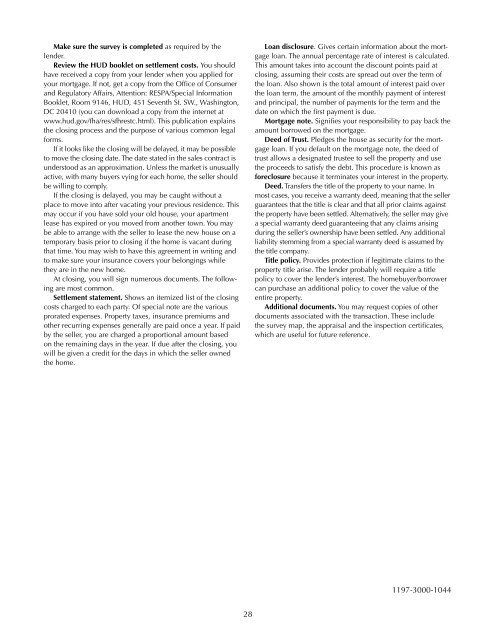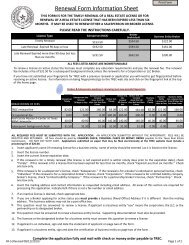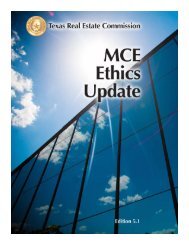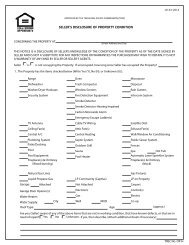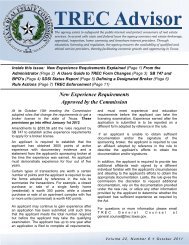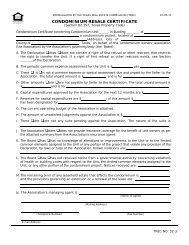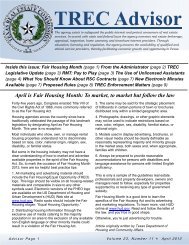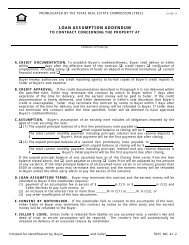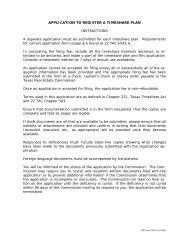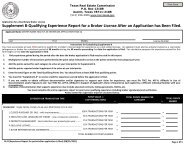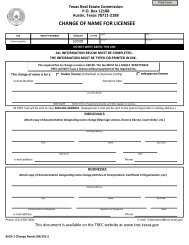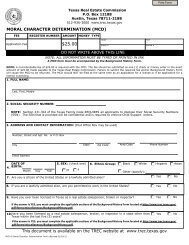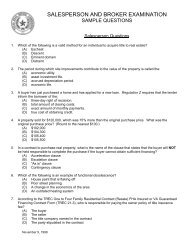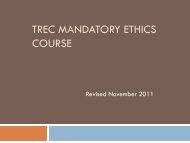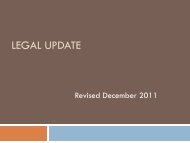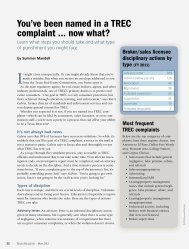Homebuyer's Guide - Real Estate Center - Texas A&M University
Homebuyer's Guide - Real Estate Center - Texas A&M University
Homebuyer's Guide - Real Estate Center - Texas A&M University
Create successful ePaper yourself
Turn your PDF publications into a flip-book with our unique Google optimized e-Paper software.
Make sure the survey is completed as required by the<br />
lender.<br />
Review the HUD booklet on settlement costs. You should<br />
have received a copy from your lender when you applied for<br />
your mortgage. If not, get a copy from the Office of Consumer<br />
and Regulatory Affairs, Attention: RESPA/Special Information<br />
Booklet, Room 9146, HUD, 451 Seventh St. SW., Washington,<br />
DC 20410 (you can download a copy from the internet at<br />
www.hud.gov/fha/res/sfhrestc.html). This publication explains<br />
the closing process and the purpose of various common legal<br />
forms.<br />
If it looks like the closing will be delayed, it may be possible<br />
to move the closing date. The date stated in the sales contract is<br />
understood as an approximation. Unless the market is unusually<br />
active, with many buyers vying for each home, the seller should<br />
be willing to comply.<br />
If the closing is delayed, you may be caught without a<br />
place to move into after vacating your previous residence. This<br />
may occur if you have sold your old house, your apartment<br />
lease has expired or you moved from another town. You may<br />
be able to arrange with the seller to lease the new house on a<br />
temporary basis prior to closing if the home is vacant during<br />
that time. You may wish to have this agreement in writing and<br />
to make sure your insurance covers your belongings while<br />
they are in the new home.<br />
At closing, you will sign numerous documents. The following<br />
are most common.<br />
Settlement statement. Shows an itemized list of the closing<br />
costs charged to each party. Of special note are the various<br />
prorated expenses. Property taxes, insurance premiums and<br />
other recurring expenses generally are paid once a year. If paid<br />
by the seller, you are charged a proportional amount based<br />
on the remaining days in the year. If due after the closing, you<br />
will be given a credit for the days in which the seller owned<br />
the home.<br />
Loan disclosure. Gives certain information about the mortgage<br />
loan. The annual percentage rate of interest is calculated.<br />
This amount takes into account the discount points paid at<br />
closing, assuming their costs are spread out over the term of<br />
the loan. Also shown is the total amount of interest paid over<br />
the loan term, the amount of the monthly payment of interest<br />
and principal, the number of payments for the term and the<br />
date on which the first payment is due.<br />
Mortgage note. Signifies your responsibility to pay back the<br />
amount borrowed on the mortgage.<br />
Deed of Trust. Pledges the house as security for the mortgage<br />
loan. If you default on the mortgage note, the deed of<br />
trust allows a designated trustee to sell the property and use<br />
the proceeds to satisfy the debt. This procedure is known as<br />
foreclosure because it terminates your interest in the property.<br />
Deed. Transfers the title of the property to your name. In<br />
most cases, you receive a warranty deed, meaning that the seller<br />
guarantees that the title is clear and that all prior claims against<br />
the property have been settled. Alternatively, the seller may give<br />
a special warranty deed guaranteeing that any claims arising<br />
during the seller’s ownership have been settled. Any additional<br />
liability stemming from a special warranty deed is assumed by<br />
the title company.<br />
Title policy. Provides protection if legitimate claims to the<br />
property title arise. The lender probably will require a title<br />
policy to cover the lender’s interest. The homebuyer/borrower<br />
can purchase an additional policy to cover the value of the<br />
entire property.<br />
Additional documents. You may request copies of other<br />
documents associated with the transaction. These include<br />
the survey map, the appraisal and the inspection certificates,<br />
which are useful for future reference.<br />
1197-3000-1044<br />
28


